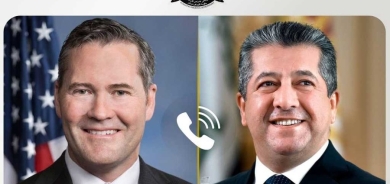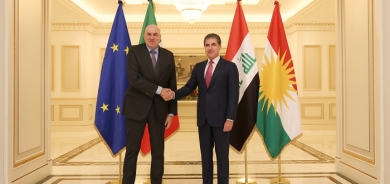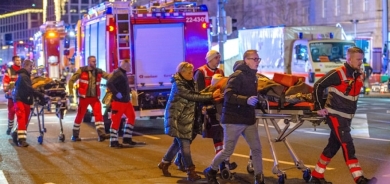Brendan O'Leary to Gulan Magazine: Only a fool would say the break-up of Iraq will never happen
October 12, 2011
Exclusive Interviews

The Professor Brendan O'Leary is a Lauder Professor of Political Science and the Head of (Penn Program) for the Ethnic Issues in the University of Pennsylvania, and he is a former Head of Solomon Center for Anthropology Issue Studies. In spite that the Professor O'Leary is an expert and specialist on national question issue across the world, he is also closely familiar with the Kurdish Question and about Iraq as well, and he was one of the International Constitution Consultants when he participated as a consultant in writing the Iraqi Constitution. The professor O'Leary is one of the three academics, who wrote (The Future of Kurdistan in Iraq) book. And he is also preparing a booklet about the Kurdistan Regional government under the title (Investment in the Future), and he exclusively interviewed Mr. Nechirvan Barzani, the Kurdish former Prime Ministers, in the same booklet. The Professor O'Leary is a member in that Team that work in the United States on the implementation of the Article 140 and the restoration of the disputed areas to be rejoined to Kurdistan Region. And the Professor O'Leary also believes that Kurdistan Region don’t have to wait for Baghdad’s government to implement the Article 140, yet Kurdistan Region is entitled to do so by itself and that the Kurds can take serious and necessary steps in that respect. However we have exclusively interviewed the Professor O'Leary many times, and in spite that we published his writings in our magazine; this time, and once again, we have addressed few questions to the Professor O'Leary in an exclusive interview to Gulan Magazine regarding to the current situations in Iraq and the way of resolving the existing issues between Erbil and Baghdad, along with the future of Kurdistan Region, the Professor O'Leary responded to us as the following:Brendan O'Leary to Gulan Magazine: “Kurdistan must not be passive. It must take the initiative and make clear and reasonable proposals on the disputed territories. It must make public and credible commitments to the non-Kurdish minorities in the territories, consistent with previously articulated principles and much practice”
* With the approaching to the US withdrawal schedule, self-attack and explosions have increased in Iraq which are obviously signs that Iraq’s security situation is still not stable enough so as to let US troops to withdraw. According to your opinion; don’t you agree that the withdrawal of US troops further endangers security situation of Iraq?
- Iraq's security situation is deeply inadequate, though the Kurdistan Region's internal security is strikingly different.
But the reality is that a US withdrawal is underway, as signaled long ago by President's Obama's election victory in 2008.
All that remains negotiable is the scale of any remaining presence of troops (in a training capacity). No Republican candidate is campaigning to keep the US in Iraq. And all US Presidents will insist on legal immunity for US troops.
There have been many US failures and successes in Iraq. Withdrawing the military without having helped settle the disputed territories may soon be judged one of the biggest failures. We shall see. Of course the US does not bear sole responsibility for the existence of the disputed territories or the failure to resolve them, but nevertheless the US decided to undertake regime change, and declared that it would help Iraqis end and unwind gross injustices caused by the Baathists. In respect of the disputed territories the task was scarcely even attempted.
* After the 2010’s elections, which has almost been 2 years, the Iraqi government hasn’t been shaped completely and there are still obstacles which haven’t been resolved. So, in your view please; how the Iraqi politicians can run the country while they haven’t been able to shape the government within two years?
- Prime Minister Maliki and his colleagues have broken their promises, both to the Kurdistan Alliance and to Allawi's alliance, perhaps not surprisingly because to satisfy both is very difficult. Maliki has not presided over meaningful cabinet government.
What will happen if there is no coup is simple: at the next elections Maliki will not be returned as Prime Minister.
Kurds came under pressure to return Maliki to the premiership from the US, but once the US has left, the Kurds will have little incentive to return Maliki to office.
Kurdistan arguably failed in its negotiations in the formation of the last federal government: it spent unnecessary political capital on the presidency, failed to specify demands which could have been undertaken by the executive without the passage of laws, to require their time-tabled implementation; and it failed to demand the exclusion of Sharastani from any office with power over the management of natural resources. Kurds should have insisted upon a major domestic ministry - either Natural Resources or the Ministry of Finance. They should learn from this moment.
* According to many the speech of many political parties in Iraq; Dr. Maliki, the Iraqi PM, is heading toward autocracy and dictatorship. So, if the Iraqi PM continues his attempts and returns to dictatorship, what happens to the political future of Iraq?
- I think Maliki is unable to execute a coup, even if he wanted to do so. The army would break apart in his hands. Maliki's term of office is limited - he will be politically extinct within two years. Those who oppose Maliki should consider removing from office lawfully - either for breaking the law and the constitution, or through a resolution of "no confidence." It is perhaps time to call for fresh federal elections, provided Kurdistan's parties and people are ready for them.
* There are some suspended problems between Kurds and Federal government in Baghdad, the most important one among them is the problem of disputed territories. Observers think that these problems are going to be more complicated. So, if the tension increases, how far there will be the risk of civil war to take place in Iraq?
- Kurdistan must not be passive. It must take the initiative and make clear and reasonable proposals on the disputed territories. It must make public and credible commitments to the non-Kurdish minorities in the territories, consistent with previously articulated principles and much practice. These commitments should include clear and detailed proposals for power-sharing in Kirkuk city and governorate, and clear proposals for deciding which districts and sub-districts should go to which governorates. The proposals must be linked to the draft constitution of Kurdistan, and firmly protect the rights of minorities.
* The Iraqi neighboring countries, especially Turkey and Iran are currently trespassing Iraqi borders in particular Iraqi Kurdistan region’s border. So, how far their interfering will increase much more by the withdrawal of USA from the ground?
- The KRG needs to maintain good diplomatic relations with Turkey, without sacrificing any of its rights or principles. Good relations with Turkey are the route to resolving many issues for the KRG: including the disputed territories and the defense of its autonomous oil policy. After the US withdrawal the Turks will appreciate that the KRG provides them with a zone of security. This will be an opportunity for the KRG, not a disaster. Iran is much the more difficult neighbor in the long run - though arguably it is less powerful.
* Many observers think that; if tension re-occurs in Iraq again, it will be difficult to have the different components of Iraq, Kurds, Sunni and Shiite, being able to live together. So, how far do you see the probability that Iraq may collapse just like the former Yugoslavia?
- The break-up of Iraq has been much forecast. Only a fool would say it will never happen. In my view, Kurdistan's policy should be, as it is now, to make Iraq work as a federation. That means working hard to build allies elsewhere in Iraq, and in the wider region; it is a policy which requires patience, profound patience. If a military dictatorship comes to power in Baghdad, then the KRG will have every political and moral right to secede, and the legal right to do so (after all it re-joined Iraq as a voluntary act, and the Constitution is defined in its Preface as voluntary union of land and people). But secession is an option only to be used in extreme circumstances. Legal rights are not always respected, as Kurds know. Deepening good relations with Turkey is prudent politics, both now and as insurance. Whether inside the federation, or independent, Kurdistan will have Turkey as a neighbor. It is a neighbor which is going through major changes: Kurds should work constructively with these changes while insisting on their rights. Kurds should recall how grim life was when they were unrecognized between 1992 and 2003. Work for the best, prepare for the worst.
Perhaps Arab Iraq will return to full-scale civil war; though Kurdistan became a scapegoat to re-build Arab unity if it is not careful. That there will be significant further conflict seems likely. Will the Arabs coalesce to reduce the role of Iran in their affairs, or will Iran keep them divided and weak? That is the question. Will Iran itself will remain stable? After all when the Americans leave Iraq the Iranian regime may divide over what to do next, and America may be able to pressurize Iran more easily when it is not deeply present in Iraq.
Kurds need to recall the consequences of their own past disunity: they don't all need to be in the same party, but they do need to work together, under a common platform of constitutional rights, within Iraq and their own Region. They should test every argument and proposal against the standard of whether it protects their rights or endangers them.
Brendan O'Leary
Lauder Professor of Political Science
University of Pennsylvania
www.brendanoleary.org















